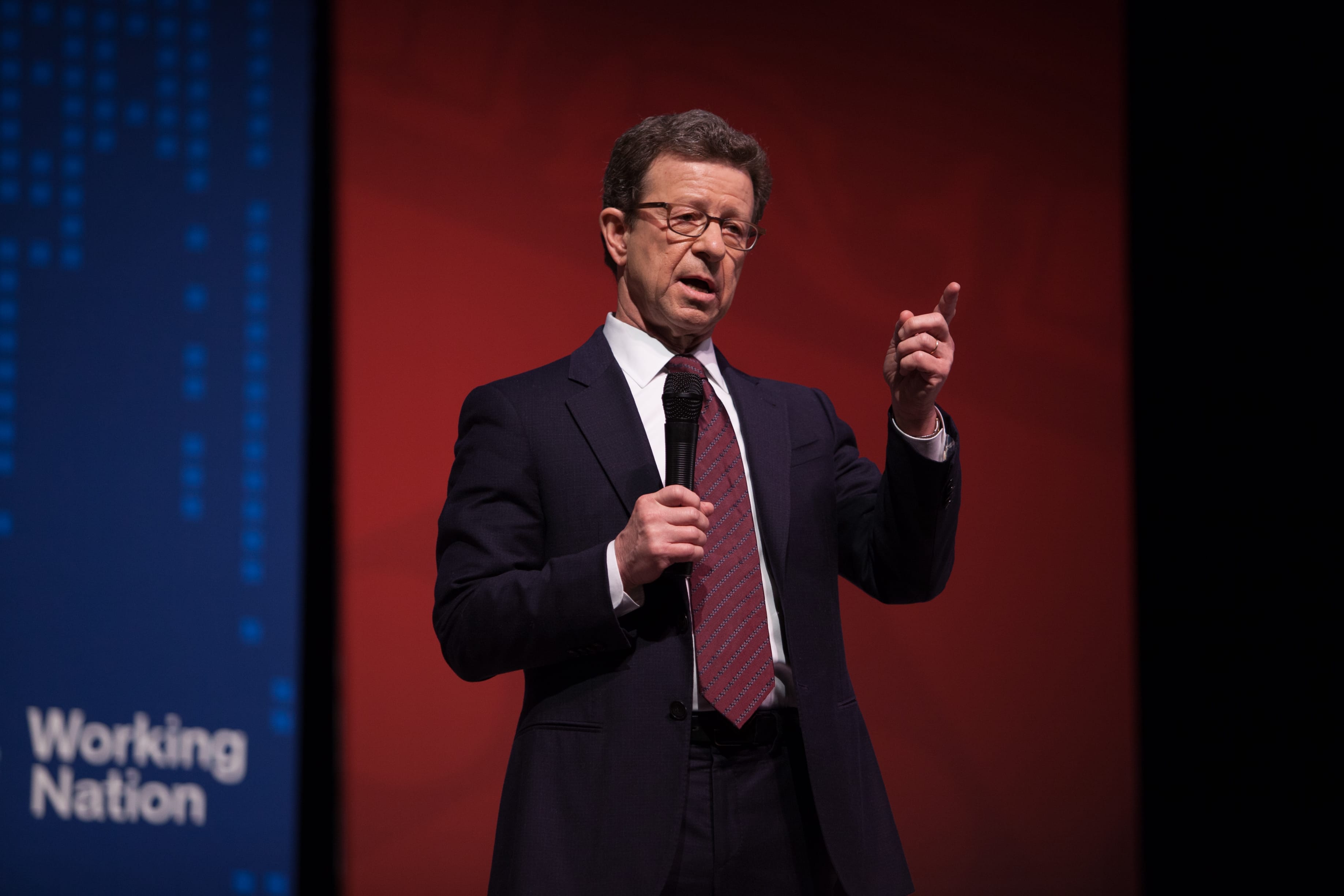Companies today have vast amounts of data at their fingertips, but finding skilled workers who can analyze it is proving hard.
That premise was the focus of a town hall hosted by the Wharton Customer Analytics Initiative and nonprofit WorkingNation on February 26. The event, titled “The Future Is Now: Closing the Data Analytics Skills Gap,” brought together a dozen experts at the forefront of data analytics to discuss its ascent in the workplace.
“Data and analytics might be the fastest-growing job area in this country over the next five to 10 years, because there won’t be an aspect of business, government, or the not-for-profit world that isn’t driven by [it],” said Art Bilger W75, WCAI’s founding funder and CEO of WorkingNation. The town hall was one of several presented by WorkingNation to educate people about the future of work in an era when technology is upending jobs.

LinkedIn co-founder Allen Blue (Photo: Mayer Chalom/WorkingNation)
The growing need for data analysis among businesses has made professionals in the field an especially hot commodity, according to LinkedIn co-founder Allen Blue. “Data scientists are almost all already employed,” he said in a keynote address with CNBC contributor and event moderator Michelle Caruso-Cabrera. “There are no data scientists out there passing out their résumés, or very few, because they’re so in demand.”
Data analytics leaders, including ones from Comcast, Morgan Stanley, and PwC, took the stage for a panel to discuss how their companies are using data and attracting new talent. For all of them, data is a crucial part of their operations. “We’re embedding data and analytics in everything we do,” said PwC executive Bhushan Sethi. “It’s in all our products and services.”
Comcast, for one, is making use of large amounts of information across a range of properties, including NBC, its distribution operations, and its Universal theme parks. “It’s a very important area for us as a business,” said Ravi Kandikonda, senior vice president of marketing strategy and planning at the company.
Data also is changing the ways nonprofits and health care organizations do work. “If we could know when to intervene with a treatment before relapse occurs, we could keep quality of life much better,” said Penn Medicine executive Kevin Mahoney, explaining how data helps doctors better identify when patients with a condition such as multiple sclerosis need care. At the Bill & Melinda Gates Foundation, data is helping the group make decisions about where to focus resources in key areas such as global health, global development, and its U.S. programs, said Steve Kern, deputy director of quantitative sciences at the foundation.
But for every executive on the panel, hiring candidates who can effectively interpret data has been a challenge. To find the right people, many companies are discovering promise in employees with nontraditional backgrounds. “You don’t have to be a computer science graduate,” said Tsvi Gal, chief technology officer at Morgan Stanley. “As long as you have the right mindset and [are] willing to learn, we found that many of the students that [come] from different liberal arts are actually flourishing.”
That adaptability could be invaluable to workers as data analysis extends into more jobs, not just ones in traditionally high-tech fields.
“Data analytics as a skill—as a core capability—is increasingly foundational,” said Matt Sigelman, CEO of job-market analytics company Burning Glass Technologies, in a one-on-one discussion with Caruso-Cabrera. “The ability to understand data, the ability to analyze data, the ability to visualize and present data, are all core foundational skills that we see across dozens and dozens of occupations.”
The emergent nature of the field and immense demand for qualified candidates is opening doors for workers with atypical backgrounds.

From left to right, Community College of Philadelphia President Guy Generals, General Assembly CEO Jake Schwartz WG08, and School District of Philadelphia Chief Information Officer Melanie Harris (Photo: Mayer Chalom/WorkingNation)
Job disruption brought on by technology is creating unique chances for people to secure careers requiring technical skills without conventional four-year degrees, according to Jake Schwartz WG08, CEO of employment-education company General Assembly. “In a way, this volatility and this uncertainty has created this opportunity for people to get on on-ramps in nontraditional ways,” he said during the evening’s last panel of school leaders and work-readiness executives.
Like General Assembly, career-services group Philadelphia Works is empowering job seekers to expand their horizons to fields like data analytics. “How do we help them look at different career pathways and really begin to look at careers in a different way?” asked H. Patrick Clancy, president and CEO of the company.
To ensure every student has a level of analytical competency, educators of all types also are infusing these skills broadly into their curricula.
“We’re trying to find ways to engage students at an earlier point,” said Guy Generals, president of the Community College of Philadelphia, which now incorporates concepts related to data analytics in its general education coursework.
Educators at even the youngest stages are equipping students with these skills. The School District of Philadelphia, for example, has implemented a digital literacy curriculum that starts in kindergarten when children are taught patterns, a key characteristic of coding, said Melanie Harris, the district’s chief information officer.
These educators are betting that data analytics will become even more integral to company operations in the future, a sentiment echoed by the event’s business-executive speakers.
“It’s really, really important for every industry which has the data upon which you can build data science to be learning about it and taking advantage of it,” said LinkedIn’s Blue.

























